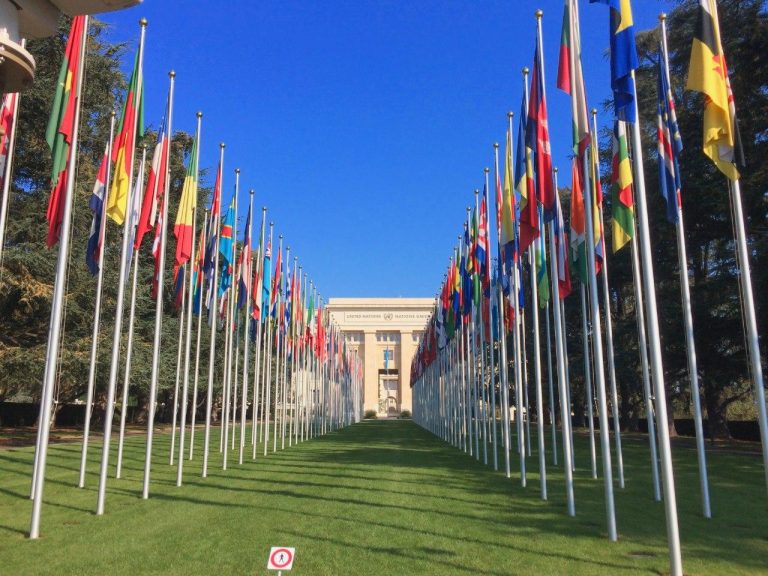
More than 110 countries have brought up questions and recommendations regarding the human rights situation in Spain, of which a total of 22 have taken the opportunity to address the violations of civil and political rights during the last five years.
The 35th session of the Universal Periodic Review (UPR) was held this morning in Geneva. The UN Member States had the opportunity to evaluate and table questions and recommendations to Spain regarding the situation and the fulfillment of their obligations regarding fundamental rights.
A total of 117 countries intervened, including France, the United States, Mexico, Colombia, Switzerland, Italy, Armenia and Iceland, but also Iraq and Russia, who were particularly critical of police violence which took place in October of 2019. When it came to civil and political rights, the contributions made by the United States, Belgium, Germany, Switzerland, Iceland, Mexico and Colombia were especially poignant, reminding Spain that these rights are essential for the proper functioning of a democracy.
References to Catalonia
Apart from the police violence criticized by Iraq, Russia and Italy, most countries insisted on protecting the rights to freedom of expression and assembly, as well as denouncing the abuse of incommunicado detention by countries such as Austria, the Czech Republic, Switzerland, the Netherlands or Malta. Venezuela referred directly to Catalonia, insisting that Spain needs to find a political solution to the conflict through dialogue.
Canada and Iceland called for a review in legislation regarding the Citizen Protection Law, (a.k.a Gag Law), as did Switzerland, who together with France emphasized the importance of reparations for the victims of the Franco regime. The United States made a special mention of journalists and Spain’s duty to protect them in the exercise of their work. Finally, Armenia demanded an investigation on hate crimes in Spain.
The Spanish delegation avoided addressing criticism of civil and political rights violations, as well as questions on arbitrary detentions, imprisonment and torture, all in relation to Catalonia’s self-determination.
A total of seven countries submitted written questions. Of these, one question was raised by Belgium in which Spain was asked about measures to implement the recommendations of the Committee on the Prevention of Torture(CPT), those of the Sub-Committee on the Prevention of Torture (SPT) and on cruel, inhuman or degrading behaviour from the Working Group on Arbitrary Detention, as well as the Special Rapporteur’s recommendations on the right to freedom of assembly and association. These institutions have had shown concern in regard to the violations of fundamental rights by the Spanish authorities and against the Catalan pro-independence movement.
In regards to this topic, Sweden inquired on the Citizen Protection Law or “Gag Law”, expressing concern with respect to the protection of the right to freedom of expression and the right to freedom of assembly and association, especially in relation to journalists and civil society, both issues related to the Catalan issue.
Iran went further, asking a question regarding the steps that the Spanish State plans to take to improve the situation with regard to these rights, mainly in the context of the 2017 referendum. The United Kingdom requested information on measures to improve the press situation. Finally, Germany asked a question regarding the Amnesty Law of 1977 and the possibility of judging the crimes of Francoism.
All these recommendations and questions will be studied henceforth, and both the States and civil society will be able to follow their level of implementation and will be able to request explanations to Spain in case of non-compliance.
More than 80 reports from civil society organizations
One of the indicators of the deterioration of the situation with respect to fundamental rights in Spain is the fact that a total of 89 reports have been submitted by civil society organizations to provide information for the Universal Periodic Review to Spain, which is a very significant increase compared to the 27 presented in the previous round in 2015.
In this regard, the joint report presented by the Catalan National Assembly and the Organization of Unrepresented Nations and Peoples (UNPO) emphasizes the persecution of political representatives of the Catalan national minority and pro-independence activists in Spain, as well as in other fields, including the cultural scene. It is also focused on the violations that are taking place with regard to the right to a fair trial, the right to assembly and demonstration, the right to public participation, the right to language and culture, and the right to freedom and security, including the prohibition of arbitrary detention, among others.
Aspects reported in the joint report of the Catalan National Assembly and UNPO were mentioned in several paragraphs of the document prepared by the office of the United Nations High Commissioner for Human Rights on the UPR in Spain.